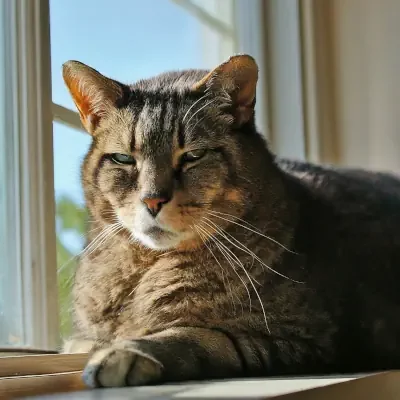I adopted my first cat, Buster, from an animal shelter when my first child was just a few
months old. Buster and Max immediately bonded and became inseparable, and kitty
reacted the same way to Max’s sister Coco, born just a year and a half later. Buster, a
handsome tuxedo cat, was abandoned by his owner and had lived at the no-kill shelter
for years before we brought him home at the ripe old age of eight. Little did I know that
he would be around to see my children nearly to adulthood. Buster was 24 when he
died peacefully at home, surrounded by his family and the two female cats we had
adopted in the intervening years.
My family was extremely fortunate to enjoy our sweet Buster’s company for so long.
Most domestic house cats live between 13 and 17 years, but there are several ways to
ensure your kitty’s senior years and are as comfortable and happy as possible.
First, keep your cat’s mind and body engaged. Just as exercise and mental stimulation
help keep the ravages of age at bay for humans, the same is true for cats. Daily
enrichment, through interactive toys and playtime with a human companion, is very
important. Learning new things aids cognitive function in older cats and can help
prevent dementia.
Second, make sure your home is adapted for your elderly cat. Your kitty shouldn’t have
to go up or down stairs to access food, water and the litter box. Senior cats may
develop arthritis and have difficultly with jumping or mobility, so a ramp may be
necessary to help them reach the places they like to hang out. Contrary to popular
belief, cats cannot see in total darkness, so adding nightlights to hallways and other
dark areas will help your cat navigate at night. Be sure there are comfy places for kitty
to sleep and that the litter box doesn’t have a high lip that makes it difficult to climb into.
In the same way that people do, cats may become set in their ways as they age. A
predictable routine around feeding and play times will likely be reassuring to an elder
cat who appreciates consistency more than novelty.
Lastly, be sure to take your cat for regularly scheduled vet visits so you don’t overlook
health problems common to senior cats. Issues like kidney disease and thyroid function
disorders are fairly common and can often be easily treated with medication. By
following these simple rules, you’ll ensure that your senior cat can live out his golden
years in the happiest and healthiest environment.
Caring for Your Senior Cat

Facebook
Twitter
LinkedIn
Pinterest
RELATED POSTS
Recognizing Signs of Pain and Discomfort in Senior Cats
March 26, 2024
No Comments
As our feline companions age, it is important for us to be vigilant in recognizing signs of pain and discomfort in them. Senior cats face ...
Read More →
Sweet Dreams for Senior Sweeties
March 16, 2024
No Comments
Choosing the Perfect Pet Bed A supportive and comfortable bed is crucial for managing your arthritic dog’s pain and promoting restful sleep. This blog delves ...
Read More →
Conquering Canine Climbs
March 4, 2024
No Comments
Rampsare best as they are the only solution that is impact free. It makes a real difference for short-legged dogs whose backs are prone to ...
Read More →




